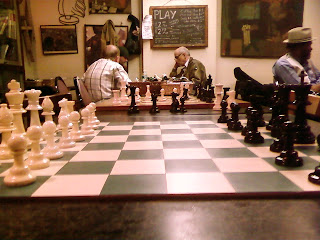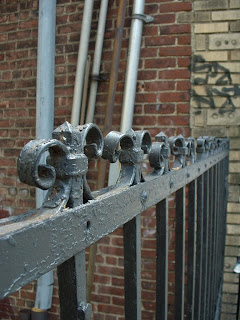So the marathon is over! Last weekend was a good one. I got several hours' sleep on call Friday night, and by 0900 Saturday I was heading to Midtown to catch the Chinatown bus to Washington DC. (The Chinatown bus enterprise has expanded to include departures from Midtown which is much more convenient for me.)
It's always an experience to ride these buses, which provide a $35 round trip between NYC and DC. One looks for a small crowd of people with bags (usually six or eight people if one arrives ten minutes early) waiting on a streetcorner. It's important to verify with at least two others who speak English that all are waiting for the same bus. At the appointed time, or even a few minutes early, a white, generally unmarked bus will round the corner. At this point, people come out of the woodwork to fill the bus. I'm always impressed with how a group of ten people expands to sixty when the bus pulls up!
On arriving to DC after a thankfully uneventful trip, I descended to the Chinatown Metro station and stood a few minutes baffled by the array of ticket choices. It seems one pays based on the distance traveled, rather than a flat fare as in New York. It's necessary to save the ticket to exit the Metro as well. I decided on the all-day pass for $6.50 and walked to my train.
The Metro, I must say, was eerily clean and quiet. It reminds me much more of London's Underground than of the Metro system's older domestic cousin a couple hundred miles to the north. The trains glide up to the platform as soft red lights flash along the edge, warning the absent-minded straphanger stand back for the approach. The stations feature huge barrel-vaulted ceilings reminiscent of New York's 168th Street station, only newer, cleaner, and starker. On board the carpeted train, I saw two people, at once, stand and insist that a woman with a toddler take their seats. (Have I changed so much after 16 months in the city? Have I grown so callous, so aloof? My feeling is that if there is as little as one open seat in the car, the young mother can take that one and seat the child on her lap. No reason to give up MY seat!)
Alison lives off the Cleveland Park stop on "The Red Line." I was amused hearing the locals call the lines by their respective colors on the Metro map. In New York, tourists are easy to spot as they wrestle with maps in blustery Midtown, ride pedicabs through Central Park, or career* through the streets on double-decker buses. But an even surer way of being nailed as a tourist is to call the 1 Train, "The Red Line," or refer to the 4,5,6 subway as "The Green Line." Silly Washingtonians! To be fair, I guess they have no need to differentiate between express and local lines.
Alison's neighborhood was charming. She lives in a four story renovated building just a couple blocks from the Metro stop. The walk their takes one past cafes with sidewalk seating and an old two-story firehouse. She parks her silver convertable Mini Cooper in a dilapidated brick stall off the alley, and her granite-countered, wood-floored apartment is home to two cats, one if which is probably the fattest I've seen.
I left my bag at Alison's before meeting up with Adam & Ashley, and friends Ernest and Sharon back downtown. We rode to Ernest and Sharon's house in Arlington where we rested for the afternoon. Adam, Ashley, and I watched college football and dozed in front of the TV while Ernest and Sharon attended a Halloween party. Since it got late, I crashed on the living room couch for the night rather than spend an hour trying to get back to Alison's.
The alarm clocks rang early the next morning! We parked near the Pentagon and joined the throngs of runners and well-wishers in the march around the gigantic building under the cool, pre-dawn sky. After a long wait for the porta-potty and a generous application of anti-chafing lube, Adam was ready to begin.
Adam and Ashley before the race.
Adam and his cheering section. From left, Sharon, Ernest, Ashley, Adam, and Jonathan.
The starting line. It took at least fifteen or twenty minutes for all the runners to pass through!
The first stretch!
We waited for Adam at mile 9, but somehow all four of us missed him! And that, in spite of real-time tracking available online: Adam's dad would call Ashley periodically with updates; the service also will text-message cell phones with updates on the runners' progress. Sadly, we weren't able to see Adam again until the finish line. Here's his final approach:
 Wearing a medal proudly!
Wearing a medal proudly!

I didn't have too much time to hang out afterward; the others dropped me off in Chinatown for me to catch the bus back. As I waited, I ran into Becky and Carolyn, two friends from Baylor who both then went to church with me in Dallas. Becky lives in Washington now, and Carolyn was up visiting her.
It was a fun, but tiring, weekend. I arrived at my 125th Street station around 2200. It was somehow comforting to be back to the density, the noise, the dirty, screeching subways, and the cool night air of New York City.
Congratulations, Adam!

 I'll have to write about the excitement at the end of my call night some other time. Today, however, was a good blogging day. I finished my shift a little after 0800 and went first thing up to the Marshall's in Marble Hill to look for a new shoulder bag since my old one, courtesy of my old violin teacher, Ms Morrow, is more than ten years old and showing its age.
I'll have to write about the excitement at the end of my call night some other time. Today, however, was a good blogging day. I finished my shift a little after 0800 and went first thing up to the Marshall's in Marble Hill to look for a new shoulder bag since my old one, courtesy of my old violin teacher, Ms Morrow, is more than ten years old and showing its age.




 Wearing a medal proudly!
Wearing a medal proudly!






 My second-favorite event at the rodeo: calf-roping. My favorite event was when the little five-year-old girls were released from the chute riding a bucking lamb.
My second-favorite event at the rodeo: calf-roping. My favorite event was when the little five-year-old girls were released from the chute riding a bucking lamb.
 I took Mauricio to the Sixth Floor Museum which is all about the Kennedy assasination. Afterward we had a drink up in Reunion Tower. Here's a view of Dealy Plaza from the tower. The School Book Depository (which now houses the museum) is the 7-story orange brick building.
I took Mauricio to the Sixth Floor Museum which is all about the Kennedy assasination. Afterward we had a drink up in Reunion Tower. Here's a view of Dealy Plaza from the tower. The School Book Depository (which now houses the museum) is the 7-story orange brick building. I went down to Waco for a day with DO to visit our old roommate Clint, his wife Kristin, and 8-month old Luke. Reese, Jennifer, and daughter Madeline came over for dinner. Here's a picture of Luke and Uncle Jonathan.
I went down to Waco for a day with DO to visit our old roommate Clint, his wife Kristin, and 8-month old Luke. Reese, Jennifer, and daughter Madeline came over for dinner. Here's a picture of Luke and Uncle Jonathan. And an older picture of Luke. (This is the paradox of photography: the picture is older, but in it Luke is younger.) His hair is very soft and fluffy.
And an older picture of Luke. (This is the paradox of photography: the picture is older, but in it Luke is younger.) His hair is very soft and fluffy.













 The cathedral more or less how it looks today.
The cathedral more or less how it looks today.















